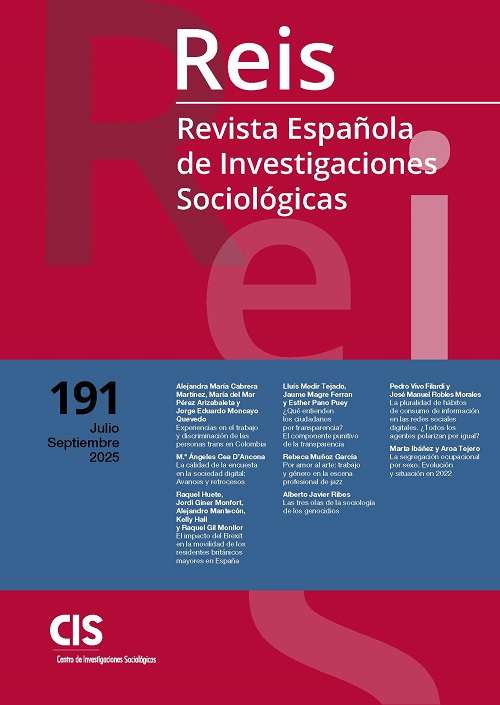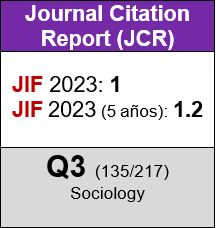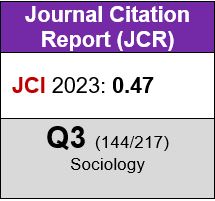Por amor al arte: trabajo y género en la escena profesional de jazz
DOI:
https://doi.org/10.5477/cis/reis.191.81-96Palabras clave:
Trabajo artístico, Precariedad, Género, Jazz, Mujeres, MúsicaResumen
La teorización sobre el concepto de trabajo ocupa un espacio menor en la sociología cuando se hace referencia a las profesiones artísticas. Este artículo explora las relaciones entre ese concepto y el desarrollo de trayectorias profesionales en el jazz a través de los resultados obtenidos en cuarenta y dos entrevistas en profundidad con mujeres artistas. Los resultados muestran que el trabajo artístico-musical está directamente relacionado con la idea de trabajar «por amor al arte», pero es determinante que el jazz sea un campo profesional predominantemente masculinizado. Una difícil separación de las esferas personal y profesional, el «estilo de vida bohemio o alternativo» y la deslegitimación profesional afecta directamente a las artistas. Se concluye que la experiencia profesional en el jazz presenta mayores dificultades para las mujeres desde una perspectiva comparativa internacional inusualmente explorada.
Descargas
Citas
Alonso, Celsa (2013). Aphrodite’s Necklace Was Not Only a Joke: Jazz, Parody and
Feminism in Spanish Musical Theatre (1900-1939). En: S. Martínez y H. Fouce (eds.). Made in Spain: Studies in Popular Music. New York: Routledge.
Ambert, Anne-Marie; Adler, Patricia A.; Adler, Peter y Detzner, Daniel F. (1995). «Understanding and Evaluating Qualitative Research». Journal of Marriage and Family, 57(4): 879-93. doi: 10.2307/353409
Arditi, David (2019). «Music Everywhere: Setting a Digital Music Trap». Critical Sociology, 45(4-5): 617-630. doi: 10.1177/0896920517729192
Azzellini, Dario; Greer, Ian y Umney, Charles (2022). «Why isn't there an Uber for live music? The digitalisation of intermediaries and the limits of the platform economy». New Technology, Work & Employment, 37(1): 1-23.
Baudelot, Christian y Gollac, Michel (dir.) (2003). Travailler pour être heureux? Le bonheur au travail en France. Paris: Fayard.
Becker, Howard (2009). Outsiders hacia una sociología de la desviación. Barcelona: Siglo XXI editores.
Beck, Ulrich (2000). The Brave New World of Work. Cambride, UK: Polity Press.
Beck, Ulrich (2002). La sociedad del riesgo. Hacia una nueva modernidad. Barcelona: Paidós.
Bull, Anna y Scharff, Christina (2021). «Classical Music as Genre: Hierarchies of Value within Freelance Classical Musicians’ Discourses». European Journal of Cultural Studies, 24(3): 673-689. doi: 10.1177/13675494211006094
Buscatto, Marie (2022). Women in Jazz: Musicality, Femininity, Marginalization. London: Routledge.
Casanovas, Roser y Gutiérrez, Blanca (2013). La vida cotidiana en las áreas residenciales monofuncionales de baja densidad. En: Z. Muxí (coord.). Postsuburbia. Barcelona: Comanegra.
Durán, María Ángeles (2000). La contribución del trabajo no remunerado a la economía española: alternativas metodológicas. Madrid: Instituto de la Mujer.
Durán, María Ángeles (2012). El trabajo no remunerado en la economía global. Bilbao: Fundación BBVA.
Gallego, Juan Ignacio (2022). «New synergies between the podcast and music industries: Spotify plays the rhythm». Radio Journal: International Studies In Broadcast & Audio Media, 20(1): 105-121.
Gandini, Alessandro (2019). «Labour process theory and the gig economy». Human Relations, 72(6): 1039-1056. doi: 10.1177/0018726718790002.
Gill, Rosalind (2014). «Unspeakable inequalities: postfeminism, entrepreneurial subjectivity, and the repudiation of sexism among cultural workers». Social Politics: International Studies in Gender, State and Society, 21(4): 508-528.
Giner, Salvador; Lamo de Espinosa, Emilio y Torres, Cristóbal (eds.) (2006). Diccionario de Sociología. Madrid: Alianza Editorial.
Hesmondhalgh, David y Baker, Sarah (2012). Creative Labour: Media Work in Three Cultural Industries. London: Routledge.
Hoedemaekers, Casper (2018). «Creative work and affect: Social, political and fantasmatic dynamics in the labour of musicians». Human Relations, 71(10): 1348-1370.
Iglesias, Iván (2017). La modernidad elusiva: jazz, baile y política en la guerra civil española y el franquismo (1936-1968). Madrid: Centro de Investigaciones Sociológicas.
ILO (2012). Decent Work Indicators. Concepts and Definitions. ILO Manuals, May. Geneve: ILO.
Jago, Marian (2019). Sitting In and Subbing Out: The Gig Economy of 1960s New York. En: N. Gebhardt.; N. T. Rustin y T. Whyton (eds.). The Routledge Companion to Jazz Studies. New York: Routledge.
Kvale, Steinar (1996). Interview Views: An Introduction to Qualitative Research Interviewing. London: Sage publications.
Kücklich, Julian (2005). «Precarious playbour: Modders and the digital games industry». Fibreculture, 5(1): 1-5.
Lloyd, Richard (2010). Neo-Bohemia: Art and Commerce in the Postindustrial City. New York: Routledge.
McAndrew, Siobhan y Widdop, Paul (2021). «The Man That Got Away’: Gender Inequalities in The Consumption and Production of Jazz». European Journal of Cultural Studies, 24(3): 690-716.
Menger, Pierre Michel (2011). Les intermittents du spectacle. Sociologie du travail flexible. Paris: Editions de l'Ecole des Hautes Études en Sciences Sociales.
Menger, Pierre Michel (2016). «Difference, Competition and Disproportion. The Sociology of Creative Work». Inaugural Lecture delivered on Thursday 9 January 2014. Paris: Collège de France.
Moen, Phyllis (2011). «From ‘work-family’ to the ‘gendered life course’ and ‘fit’: five challenges to the field». Community, Work & Family, 14(1): 81-96. doi: 10.1080/13668803.2010.532661
Mortimer, J. T y Moen, Phyllis (2016). The changing social construction of age and the life course: Precarious identity and enactment of «early» and «encore» stages of adulthood. En: M.J. Shanahan., J.T. Mortimer y M. Kirkpatrick (eds.). Handbook of the Life Course: Volume II. S.I: Springer International Publishing.
Muñoz-García, Rebeca (2022). Breaking Down Barriers: Female Jazz Musicians in Spain. En: J. Reddan, M. Herzig y M. Kahr (eds.). The Routledge Companion to Jazz and Gender. New York: Routledge.
Muñoz-García, Rebeca y Tobío Soler, Constanza (2023). «Gender and Jazz Research in Spain: On the way to finding its own voice». Jazz Research Journal, 16.2: 107-128. doi: 10.1558/jazz.26638
Pinheiro, Ricardo N. F. (2023). «Past, Present and Future Jazz: Scholarship, Historiography, Education and Performance». International Review of the Aesthetics & Sociology of Music, 54(2): 269-297.
Pugh, Allison (2015). The tumbleweed society: Working and caring in an age of insecurity. New York: Oxford University Press.
Ruesga, Santos Miguel (2021). «La larga marcha de la economía informal en Latinoamérica». EconomíaUNAM,18(53): 95-125.
Sánchez, Raquel (2019). Señoras fuera de casa: mujeres del XIX: la conquista del espacio público. Madrid: Los Libros de la Catarata.
Srnicek, Nick (2018). Capitalismo de plataformas. Buenos aires: Caja Negra.
Tobío, Constanza (2005). Madres que trabajan: dilemas y estrategias. Madrid: Catedra.
Tobío, Constanza (2012). «Cuidado e identidad de género. De las madres que trabajan a los hombres que cuidan». Revista Internacional De Sociología, 70(2): 399-422. doi: 10.3989/ris.2010.08.26
Weeks, Kathi (2007). «Life within and against work: Affective labor, feminist critique, and post-Fordist politics». Ephemera: theory and politics in organization, 7(1): 233-249.
Woodcock, Jamie y Graham, Mark (2019). The Gig Economy. A Critical Introduction. Oxford: Polity.
Zhang, Qian y Negus, Keith (2021). «Stages, Platforms, Streams: The Economies and Industries of Live Music After Digitalization». Popular Music & Society, 44(5): 539-557.
Zuboff, Shoshana (2019). The Age of Surveillance Capitalism: The Fight for a Human Future at the New Frontier of Power. New York: PublicAffairs.
Descargas
Publicado
Cómo citar
Número
Sección
Licencia
Derechos de autor 2024 Revista Española de Investigaciones Sociológicas

Esta obra está bajo una licencia internacional Creative Commons Atribución-CompartirIgual 4.0.
Permite Compartir — copiar y redistribuir el material en cualquier medio o formato, Adaptar — remezclar, transformar y construir a partir del material para cualquier propósito, incluso comercialmente.








